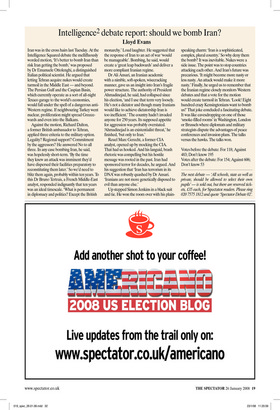Intelligence 2 debate report: should we bomb Iran?
Lloyd Evans
Iran was in the cross hairs last Tuesday. At the Intelligence Squared debate the mellifluously worded motion, ‘It’s better to bomb Iran than risk Iran getting the bomb,’ was proposed by Dr Emanuele Ottolenghi, a distinguished Italian political scientist. He argued that letting Tehran acquire nukes would create turmoil in the Middle East — and beyond. The Persian Gulf and the Caspian Basin, which currently operate as a sort of all-night Texaco garage to the world’s economies, would fall under the spell of a dangerous antiWestern regime. If neighbouring Turkey went nuclear, proliferation might spread Greecewards and even into the Balkans.
Against the motion, Richard Dalton, a former British ambassador to Tehran, applied three criteria to the military option. Legality? Regional support? Commitment by the aggressors? He answered No to all three. In any case bombing Iran, he said, was hopelessly short-term. ‘By the time they knew an attack was imminent they’d have dispersed their facilities preparatory to reconstituting them later.’ So we’d need to blitz them again, probably within ten years. To this Dr Bruno Tertrais, a French Middle-East analyst, responded indignantly that ten years was an ideal timescale. ‘What is permanent
webad 1/23/08 8:49 AM Pae 1
in diplomacy and politics? Except the British monarchy.’ Loud laughter. He suggested that the response of Iran to an act of war ‘would be manageable’. Bombing, he said, would create a ‘great leap backwards’ and deliver a more compliant Iranian regime.
Dr Ali Ansari, an Iranian academic with a nimble, soft-spoken, wisecracking manner, gave us an insight into Iran’s fragile power structure. The authority of President Ahmadinejad, he said, had collapsed since his election, ‘and I use that term very loosely. He’s not a dictator and though many Iranians would like to achieve dictatorship Iran is too inefficient.’ The country hadn’t invaded anyone for 250 years. Its supposed appetite for aggression was probably overstated. ‘Ahmadinejad is an existentialist threat,’ he finished, ‘but only to Iran.’ Reuel Marc Gerecht, a former CIA analyst, opened up by mocking the CIA. That had us hooked. And his languid, brash rhetoric was compelling but his hostile message was rooted in the past. Iran had sponsored terror for decades, he argued. And his suggestion that ‘Iran has terrorism in its DNA’ was robustly quashed by Dr Ansari. ‘Iranians are not more genetically disposed to evil than anyone else.’ Up stepped Simon Jenkins in a black suit and tie. He won the room over with his plain speaking charm: ‘Iran is a sophisticated, complex, plural country.’ So why deny them the bomb? It was inevitable. Nukes were a side issue. The point was to stop countries attacking each other. And Iran’s future was precarious. ‘It might become more nasty or less nasty. An attack would make it more nasty.’ Finally, he urged us to remember that the Iranian regime closely monitors Western debates and that a vote for the motion would create turmoil in Tehran. ‘Look! Eight hundred crazy Kensingtonians want to bomb us!’ That joke concluded a fascinating debate. It was like eavesdropping on one of those ‘smoke-filled rooms’ in Washington, London or Brussels where diplomats and military strategists dispute the advantages of peace conferences and invasion plans. The talks versus the hawks. The talks won.
Votes before the debate: For 118; Against 483; Don’t know 195 Votes after the debate: For 154; Against 606; Don’t know 53 The next debate — ‘All schools, state as well as private, should be allowed to select their own pupils’ — is sold out, but there are reserved tickets, £35 each, for Spectator readers. Please ring 020 7575 1812 and quote ‘Spectator Debate 02’.










































































 Previous page
Previous page